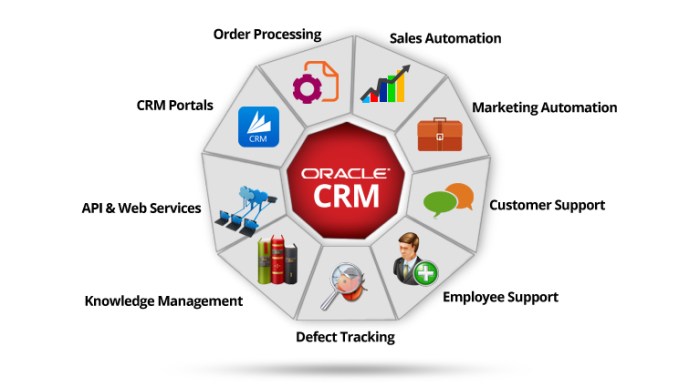Enterprise CRM solutions are transforming the way organizations manage customer relationships and streamline operations. As businesses face increasing complexity in their interactions with clients and stakeholders, these comprehensive systems provide the tools necessary to enhance engagement and drive success. By integrating advanced functionalities, such as automation and analytics, enterprise CRM solutions empower organizations to not only adapt but thrive in a competitive landscape.
The evolution of CRM systems highlights their growing importance in business operations. From simple contact management tools to sophisticated platforms capable of analyzing customer behavior and predicting trends, enterprise CRM solutions have become a cornerstone for companies seeking to improve customer relationships and retention.
Overview of Enterprise CRM Solutions

Enterprise Customer Relationship Management (CRM) solutions are comprehensive systems designed to manage a company’s interactions with current and potential customers on a large scale. Their primary functions include managing customer data, automating sales processes, and facilitating communication across different departments. Over the years, CRM systems have evolved significantly, transitioning from simple contact management tools to complex platforms that leverage data analytics and integration capabilities. The significance of these solutions lies in their ability to streamline business operations, enhance customer satisfaction, and drive revenue growth.
Key Features of Enterprise CRM Solutions
Enterprise CRM solutions are distinguished by their advanced features that cater specifically to the needs of large organizations. These features often include:
- Automation: Automating repetitive tasks such as data entry and follow-up workflows enhances productivity and reduces errors.
- Analytics: Built-in analytics tools provide insights into customer behavior, sales performance, and market trends, enabling data-driven decision-making.
- Integration Capabilities: Seamless integration with other enterprise systems, like ERP (Enterprise Resource Planning) and marketing automation platforms, enhances data flow and operational efficiency.
- Mobile Accessibility: Mobile-friendly interfaces allow sales teams to access CRM functionalities on-the-go, improving response times and user engagement.
Benefits of Implementing Enterprise CRM Solutions

The implementation of enterprise CRM solutions offers vast advantages for large organizations. These benefits include:
- Improved Customer Relationships: Enhanced tracking of customer interactions fosters stronger relationships and boosts retention rates.
- Increased Efficiency: Processes become more streamlined, enabling teams to focus on high-value tasks rather than manual data entry.
- Enhanced Data Management: Centralized customer information ensures that all departments have access to the same accurate data, fostering collaboration.
- Measuring ROI: Organizations can measure the return on investment from CRM implementations by tracking improvements in customer acquisition costs and overall sales growth.
Challenges in Adopting Enterprise CRM Solutions
While CRM solutions offer numerous benefits, organizations often face challenges during implementation. Common hurdles include:
- Resistance to Change: Teams may be hesitant to adopt new systems, necessitating effective change management strategies.
- Data Migration Issues: Transitioning from legacy systems to a new CRM can lead to data loss or corruption if not managed carefully.
- Complexity of Use: The extensive functionalities of enterprise CRM systems can overwhelm users; thus, comprehensive training is essential.
Comparison of Leading Enterprise CRM Solutions

To aid organizations in selecting the right CRM system, a comparative analysis of top CRM providers is necessary. Below is a table showcasing various features, pricing, and target industries of leading CRM solutions.
| CRM Provider | Key Features | Pricing | Target Industries |
|---|---|---|---|
| Salesforce | Customization, AI capabilities, extensive integrations | Starting at $25/user/month | All industries |
| Microsoft Dynamics 365 | Seamless integration with Microsoft products, analytics tools | Starting at $65/user/month | Retail, manufacturing, finance |
| HubSpot CRM | Free tier, marketing automation, simple usability | Free and premium options | Small to mid-sized businesses |
Integration of Enterprise CRM Solutions with Other Systems
Integrating CRM systems with other business tools, such as ERP and marketing automation platforms, is crucial for maximizing their effectiveness. Successful integrations can lead to:
- Enhanced Data Flow: Real-time data sharing between systems reduces data silos and improves decision-making.
- Streamlined Processes: Automated workflows across systems can eliminate redundancies and increase operational efficiency.
- Improved Reporting: Consolidated data allows for more comprehensive reporting and analytics, supporting strategic planning.
Future Trends in Enterprise CRM Solutions
The landscape of enterprise CRM solutions is continually changing, influenced by emerging trends that shape customer interactions. Key trends include:
- AI and Machine Learning: Increased use of AI for predictive analytics and personalized marketing will redefine customer engagement.
- Personalization: Tailoring customer experiences based on data insights will become increasingly important in retaining clients.
- Cloud-Based Solutions: The shift towards cloud platforms will enhance accessibility and support remote work environments.
Best Practices for Maximizing CRM Effectiveness
To ensure the effectiveness of CRM implementations, organizations should adopt several best practices:
- User Adoption Strategies: Engaging users from the early stages of implementation helps in building acceptance and enthusiasm.
- Ongoing Training: Regular training sessions and resources ensure that users stay updated on system features and best practices.
- Performance Evaluation: Continuously assessing CRM performance and soliciting user feedback can guide necessary adjustments and improvements.
Last Word: Enterprise CRM Solutions
In summary, the implementation of enterprise CRM solutions presents both opportunities and challenges for large organizations. While they can significantly enhance customer relationships and operational efficiency, companies must navigate issues like resistance to change and data migration hurdles. By embracing best practices and staying attuned to emerging trends, businesses can maximize the effectiveness of their CRM systems and position themselves for future success in an ever-evolving market.
